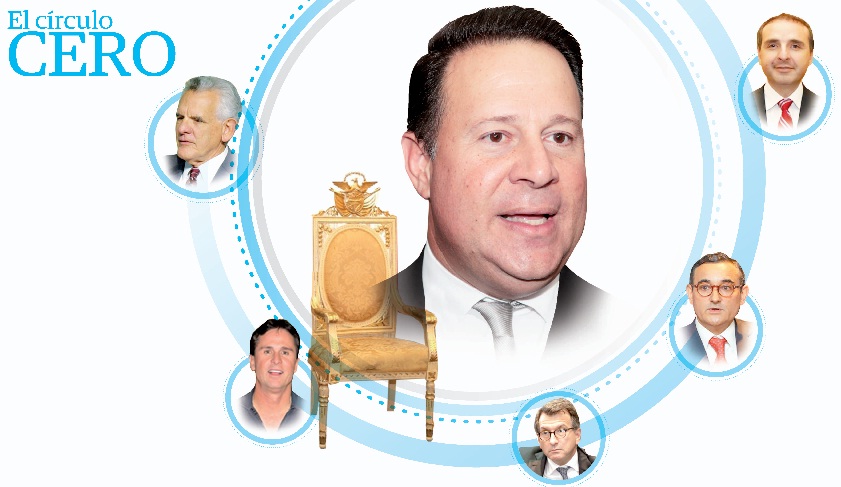Money, religion and power: the close entourage of President Varela
Actualizado 2016/05/18 09:12:33
- Redacción /nacion.pa@epasa.com /@PanamaAmerica
Since entering politics in 2008, when he first ran for president, Juan Carlos Varela worked with a parallel organization within his own party. “He never trusted the official party structure”, confesses a person who is today very close to the president.

Since entering politics in 2008, when he first ran for president, Juan Carlos Varela worked with a parallel organization within his own party. “He never trusted the official party structure”, confesses a person who is today very close to the president.
According to some of his closest associates interviewed by this newspaper, Mr. Varela is an obstinate and pig-headed leader, who finds it hard to listen and to accept that he may be in the wrong. Some go as far as to describe him as “a despot”, and now that he is president as someone who is “utterly inaccessible”.
“He bears little resemblance to the man we got to know during the election campaign”, says one of his political associates: “He only looks up for me when he needs to go to my electoral district, but he otherwise sticks to his close entourage”.
Still riding the wave of the social programs that he inherited from the administration of Ricardo Martinelli, Mr. Varela seems in reality more focused on exploiting countless business opportunities with the state on behalf of his political friends. '
Stanley MottaKnown as “The Master”, Mr. Stanley Motta was President Varela’s principal campaign donor.He is arguably the person who exerts the most influence in the current administration: his business interests are considerable and extend from Copa Airlines, Aes Panama, TVN Canal 2, ManzanilloPort as well as Carrix, Inc. and Affiliates – the latter being the likely bidder for the construction of the new port at Corozal, which is due to be put out to tender by the Panama Canal authority (ACP).President Varela has been complicit in allowing Mr. Motta to pick and choose which government positions would be the filled by the latter’s own men of confidence. Logically, Mr. Motta made sure that his associates were appointed to positions where they could best favour his principal business interest. One blatant example of that was the appointment of Joseph Fidanque III, a former executive at Copa Airlines, to the position of general manager of Tocumen Airport. One of the first action Mr. Fidanque III took, was to halt the construction of the south terminal at Tocumen Airport, so that plans could be altered to fit the specific requirements of Copa airlines. Mr. Fidanque III has also favoured another Motta related business, insurer Assa, with a contract worth $1.95m to cover the employees of the Airport terminal.Mr. Motta equally managed to get government approval allowing Copa airlines to fly to Chiriquí Airport, a route to the west of the country favored by tourists. A number of local airlines lodged acomplaint for unfair competition, as the permit to operate national flights should have compelled Copa airlines to cover less profitable routes. The lawsuits for unfair competition went nowhere.Yet another public appointment awarded to a Motta associate was that of Ivan Barria, now the head of Etesa, and brother to Aurelio Barria, an executive director at Motta International. Last September, in a surprise move, Etesa awarded a massive contract to Gas Natural del Atlantico, a subsidiary of AES, for the provision of 350MW of thermal power to the Panamanian grid. The contract award was subject to complaints by two competing firms, one of them Panama Power Corp. (Ippco), a company owned by U.S. investors, who claimed that the decision was in clear breach of Panamanian antitrust regulation. In spite of the risk of market abuse potentially resulting in higher energy costs for consumers, the Panamanian regulators turned a blind eye and the complaint was buried in the sand. Etesa’s only communication on the subject was to state that the National Authority for Public Services (Asep) had published an opinion of “no objection” on the bids presented.Mr. Motta is also shareholder in oil company Delta, which last year was awarded a juicy $52m contract to supply 75% of all the fuel needs of the Panamanian State Motor fleet for 2015 and 16.In a further sign of the degree of overlap of the state administration and Mr. Motta's business interests, President Varela named journalist Castalia Pascual, a TVN news anchor, as one of his two official spokespersons at the communication office of the presidency. Having been fiercely critical of the Martinelli administration, there were no prizes for guessing whether TV channel TVN would now turn into a cheerleader for the Varela government. Inevitably, it did. In June 2014, TVN named lawyer Temistocles de Obaldía as VP for Information Affairs, further strengthening the channel’s overtly pro-government stance, and consequently its anti-Martinelli leanings.Only 1 1/2 years into her government's post, Ms. Castalia Pascual returned to TVN, her critical faculties dulled, allegedly as a result of strong disagreements with the head of communication at the presidency, Manuel Dominguez.Mr. Motta allegedly also relies on another former executive of his defunct bank, Banco Continental: Francisco “Pancho” Salerno. Mr. Salerno is said to be the go-between that Mr. Motta uses to coordinate moves with President Varela, and currently works in Bahia Motors, the Honda Motors distributor in Panama. Mr. Motta is also principal shareholder of Carrix, the company that wishes to obtain the concession to build the new port at Corozal - something which is known to have ruffled a few feathers at the ACP.“Peter” VallarinoPedro “Peter” Vallarino Trombetta was President Varela’s roommate while at university in the USA. Since then, Mr. Vallarino has been part of the president’s close entourage. Initially named as board member of the country's savings bank (Caja de Ahorros), Mr. Vallarino didn't take long to resign so that he could focus on the more profitable business of providing services to the state.Mr. Vallarino has since been promoting the interests of its own businesses while also acting on behalf of others, such as Empresa Meco of Costa Rica and Constructora Rodsa of Chitre.Mr. Vallarino’s intercession with the president made it possible that Meco could again do business with the public works ministry, something it had been barred from doing due to its relation to theprevious administration of Ricardo Martinelli. This is how Meco came to be a sponsor of the presidential programme “ My School First” (Mi Escuela Primero). In the last two months alone, Meco was the beneficiary of multiple contracts with the state: a $96.9m contract to refurbish the Corredor de los Pobres highway; $12m for the improvement of one of Tocumen Airport landing strips; and yet another for road works in the electoral district of the president’s brother, José Luis “Popi” Varela.Meanwhile, Rodsa has also benefited from juicy state contracts, amongst them one worth $4m with Tocumen Airport.Aside from interceding on behalf of other businesses, “Peter” Vallarino has been very busy promoting his own business interests, to the point of becoming known as “Peter PAN” or the “King of PAN”, in reference to Panama’s Programme of Social Support (PAN). Indeed, according to a PAN official report, one other main beneficiaries of directly awarded contracts with this institution is a company called Airco S.A., whose president and general manager is none less than Pedro “Peter” Vallarino.Only in 2015, the PAN directly awarded 20 contracts for the provision of heavy equipment and construction material to Airco S.A., all intended for the social programme “”Roofs of Hope” (Techos de Esperanza), a housebuilding initiative for the needy managed by the housing ministry.Between October and December 214, housing minister Mario Etchelecu also awarded some 11 contracts worth $1.8m to Airco S.A. via the direct PAN route, according to official sources. Only on December 9th, the housing ministry awarded Airco SA with with 5 separate contracts for the provision of digging equipment: one of them was worth $217,000 and the others $147,000 each.Such questionable dealings have caused uproar among competing firms. Last year, building equipment providers Cardoze & Lindo, Copama, F. Icaza, Grupo Tiesa and Comerciales de Motoresjointly wrote to the housing minister to complain about the apparent favoritism granted to “Peter” Vallarinos’ Airco S.A.. However, minister Etchelecu dismissed the complaint on account of the fact that the letter had not been signed. The public ministry did launch an investigation ex oficio into the matter. However, the file has been sitting in the office of Atty. General Kenia Porcell ever since.The scandal brought to light another interesting fact: it became apparent that Peter Vallarino had named Ricardo "Ricky" Mouynes Kisswetter, son in law of the minister to the presidency, Alvaro Aleman, general manager of Airco S.A.. Additionally, Ricardo “Ricky” Mouynes Kisswetter is brother to Luis Mouynes, general manager of TV station TVN Canal 2. The Mouynes brothers have a longstanding relation with businessman Stanley Motta, since their own father, Osvaldo Mouynes, was general manager of now defunct Banco Continental, which later merged with Banco General.Today, Airco S.A. promotes itself as a leading provider of construction equipment: its ads can be seen both on television and on massive billboards. And yet this is not all: the company has transcended both the PAN and the housing ministry, by obtaining multimillion dollar contracts for the provision of synthetic pitches from the education ministry, thanks to the presidency-controlled programme "My School First".Francisco SierraFrancisco Sierra also represents the business interests of “The Master” of President Varela, as businessman Stanley Motta is known. At first, Mr. Sierra worked on the development of the government's programme for Juan Carlos Varela. Back then, his influence over the president was quite limited. However, he was later appointed as ministerial adviser to the president, and that’s when things began to change. Mr. Sierra, alongside his colleague Taher Yaffar, slowly became part of the President's close entourage, displacing other political collaborators there had been by the president's side for longer. It was Mr. Sierra who directly handled the government purchase of the shares in company Mi Bus, a move that was strongly criticized as contrary to the interests of the state. Mr. Sierra has strong links with the interests of Mr. Motta, being as he is VP of Finance at that Banco General, as well as being board member of Cable Onda.Mr. Sierra was recently appointed to the board of the Panama Canal by President Varela. The decision was strongly criticized due to the known bonds of friendship between the two men.Miguel Angel EsbriMiguel Angel Esbri is arguably the most silent of the members of President Varela is close entourage. However, he is by no means the least influential. The connection between President Varela and Mr. Esbri is not strictly businesslike in nature. It is, in fact, of a more religious nature: both men are members of the ultraconservative catholic order of Opus Dei in Panama.Opus Dei is a very powerful, if low profile, organization within the Catholic Church. The group has been at the receiving end of a barrage of criticism for supposedly conducting acts of aggressive proselytism amongst vulnerable teenagers, some of whom have suffered psychological traumas. The group is also known for his thirst for power and financial riches, as well as for threatening any members wishing to abandon the organization.Mr. Esbri, who has been nationalized Panamanian, is one of the top figures in Opus Dei’s local chapter. He is also the single most influential person with President Varela on religious matters. President Varela and Mr. Esbri are the principal sponsors of an Opus Dei school in Cerro Azul.Mr. Esbri was appointed as Executive Secretary to the Centre for Economic and Competitive Affairs, receiving a salary of $6000. Internal sources claim that Mr. Esbri unofficially controls all contracts awarded by Pandeporte, amongst other institutions.During President Varela’s first official visit to the Vatican in 2014, Mr. Esbri was one of the selected few who was granted a private audience with Pope Francis. Members of the group only included first lady Lorena Castillo, her two sons, Adrian Jose y Stefan Gabriel, the vice chancellor Luis Miguel Hincapie and Mr. Esbri himself.
As soon as he took power in 2014, Mr. Varela took immediate action to remove from the Panamanian market the only company that represented direct competition to his family business: Varela Hermanos S.A.. Such was the fate of Campos de Pesé S.A., a company belonging to Grupo Pellas, one of Central America largest business groups.
Campos de Pesé had made an incursion into ethanol production, but as of 2014 it had also launched two products that were in direct competition with those of Varela Hermanos: Seco SL and Ron Canalero. Having seen its operations suspended since 2014, Campos de Pesé has been fighting a legal battle to have them re-established via the courts. 900 people have lost their jobs as a result of the company government-ordered shut down.
Having taken out of the competition, President Varela proceeded to favour his family business further by passing Law 126, which raised the duties applicable to beer to the same level as those for hard liqueurs. The president also went as far as to promote the interests of Varela Hermanos S.A. internationally: In September 2015, Mr. Varela invited his own brother and general manager of the family company, Luis “Fulo” Varela, on an official visit to Cuba, so that he could make the initial contacts aimed at launching operations in that market. This confidential information was provided by a close associate of the president on condition of anonymity.
The close entourage of President Varela is made up of five people. Its undisputed head is millionaire businessman Stanley Motta, who happens to be Mr. Varela’s principal campaign donor. People related to the presidential entourage have been placed in key decision-making positions across government institutions. From their relative positions, these actors exert virtually accountable power and control.
President Varela’s strategy to silence public opinion on these matters has been to buy the silence of opinion makers. Mr. Varela has done so by appointing key voices of civic society to government positions, thereby raining in their criticisms. Such is the fate of at least 19 so-called representatives of civic society: their critical voices, which could not be silenced during the Martinelli administration, have now gone silent. Gone is the criticism even of directly awarded contracts, apparently a great source of corruption in the previous administration, but not so in the current.
Amongst the now notably silent anti-corruption fighters are Angélica Maytín and Fernando Berguido, of Transparency International, as well as Fernando Aramburu Porras, former president of Apede. Ms. Maytin was put in charge of the government's anti-corruption agency, while Mr. Berguido was promoted to the position of ambassador for Panama in Rome, Italy. Other civic societies voices that have been silenced by the government’s generosity are: Mariano Mena, David Ramírez, Félix Win, Idalia Martínez, Samuel Rivera, María Mercedes Corró, Bernardino Jiménez, Zuleyka Pinzón, and the journalist Castalia Pascual, to name but a few.
Cleverly, President Varela also appointed businessman Federico Humbert to the position of general comptroller, in spite of the fact that Mr. Humbert had been one of his campaign donors. Mr. Humbert himself didn’t waste any time in trying to favour his own businesses with state contracts: two of his companies were directly awarded contracts, one of which was worth $340,000, by the PAN shortly after he was named to his office. This first contract was later canceled after this newspaper brought the scandal to light, and before Mr. Humbert could take office. However, the second contract was fulfilled at a later date, once Mr. Humbert had taken office as comptroller general and could therefore personally endorse it in his new capacity. The contract in question, worth $52m, gave oil company Delta - which is owned by the Humbert and Motta families - the right to supply 75% of all the fuel needs of the motor fleet of the Panamanian state for 2015 and 2016.
Mr. Motta and Mr. Humbert are also the principles financial backers of civil society movement "Movin", something which has allowed them to silence its criticisms in the face of such scandalous dealings. However, sources have reported that the relationship between President Varela and Movin was rocked by the appointment of Angela Russo and Cecilio Cedalise as Supreme Court Justices, as well as by the re-appointment of Jose Ayu Prado as president of the Supreme Court. Once again, this would boil down to President Varela’s own stubbornness: when faced with unfavorable situations, his approach is to apply pressure and twist arms.
Not many weeks ago, news anchor Alvaro Alvarado as well as political commentator Isabel Blandon, publicly denounced being at the receiving end of a smear campaign. The source of the media briefing would be the Security Council, which sits within the presidency. A key player in the smear campaign was allegedly Miguel Heras, a director of the pro government channel TVN, and a member of Mr. Motta’s circle.
According to internal sources from the Panameñista party, the president's conduct is increasingly being influenced by the power exerted by the close members of his entourage, and driven by considerations of religion and the award of juicy business contracts with the state.









Para comentar debes registrarte y completar los datos generales.